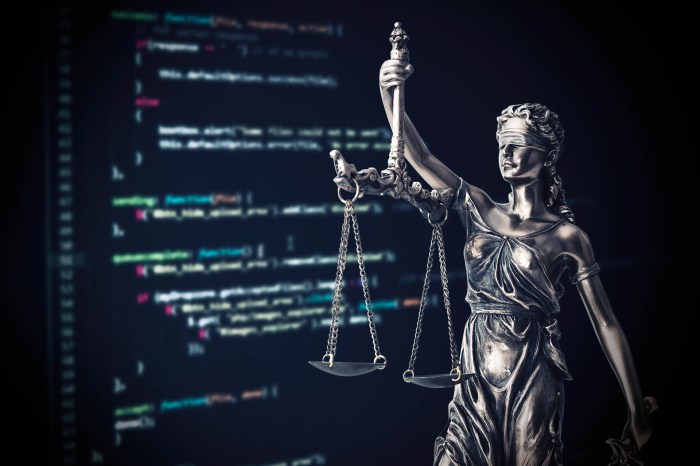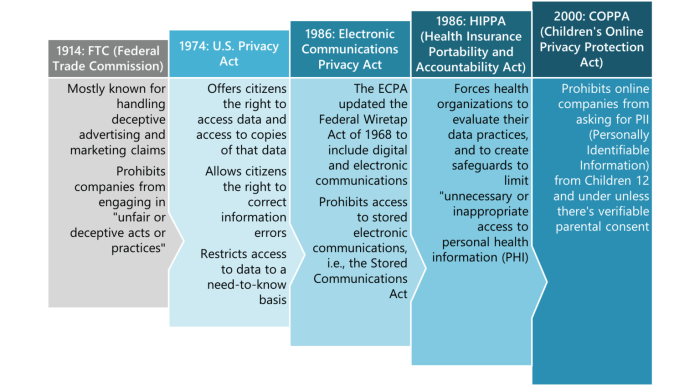As we delve into the complex world where Artificial Intelligence and the Law converge, prepare to be amazed by the intricate dance between cutting-edge technology and legal frameworks. Get ready for a rollercoaster ride of insights and surprises as we navigate through the realm of AI and its impact on the legal landscape.
Legal implications of AI in the field of intellectual property are vast and intriguing. From the challenges of protecting AI-generated works to the role of AI in detecting and preventing intellectual property infringement, the intersection of AI and intellectual property law opens up a world of possibilities and dilemmas.
Legal implications of AI in the field of intellectual property
AI technology is revolutionizing the creation and protection of intellectual property, including copyrights, trademarks, and patents. As AI continues to advance, it brings both opportunities and challenges to the legal landscape surrounding intellectual property.
Impact on copyright, trademarks, and patents
AI-generated works raise questions about ownership and authorship, challenging traditional copyright laws. While AI can assist in the creation of original works, determining the rightful owner of these works can be complex. Similarly, AI tools can help in the process of trademark searches and patent drafting, but the question of inventorship and ownership remains a challenge.
Challenges of protecting AI-generated works
One of the primary challenges in protecting AI-generated works is establishing the criteria for copyright protection. Current laws are designed to protect works created by humans, leading to uncertainties when it comes to AI-generated content. Additionally, the ability to differentiate between AI-generated works and human-created works poses a significant challenge in enforcing intellectual property rights.
Role of AI in detecting and preventing infringement
AI technology plays a crucial role in detecting and preventing intellectual property infringement. Machine learning algorithms can be used to monitor online platforms for potential copyright violations, trademark infringements, and patent infringements. AI tools can help intellectual property owners identify unauthorized use of their works and take timely legal action to protect their rights.
AI algorithms and bias in legal decision-making
Artificial intelligence (AI) algorithms are becoming increasingly prevalent in legal systems, aiding in various aspects of decision-making processes. However, the use of AI in legal decision-making raises concerns about potential biases that can be embedded in these algorithms, impacting the fairness and justice of outcomes.
Potential Biases in AI Algorithms
AI algorithms can inherit biases from the data they are trained on, leading to discriminatory outcomes in legal decision-making. For example, if historical data used to train an AI algorithm reflects biases against certain demographics, these biases can be perpetuated in the algorithm’s decision-making process.
This can result in unjust outcomes for individuals belonging to marginalized groups.
Ethical Considerations of AI in Legal Decisions
The ethical implications of using AI in legal decision-making are significant. It raises questions about accountability, transparency, and the potential erosion of human judgment in the legal system. There is a concern that relying solely on AI for decision-making could lead to a lack of empathy and nuanced understanding of complex legal cases, potentially compromising the principles of fairness and justice.
Mitigating Bias in AI Algorithms
To ensure fair and just legal outcomes, it is crucial to mitigate bias in AI algorithms. This can be achieved through various methods, such as implementing diverse and representative training data, regularly auditing AI systems for bias, and incorporating ethical guidelines into the design and development of AI algorithms.
Additionally, transparency in the decision-making process and accountability for the outcomes of AI algorithms are essential to address bias and uphold the principles of fairness in legal systems.
Automation of legal research and analysis using AI
AI tools have revolutionized the way legal research and analysis are conducted by enabling lawyers to sift through vast amounts of data quickly and efficiently. These tools utilize algorithms to analyze and extract relevant information from legal documents, court cases, and statutes, providing valuable insights to legal professionals.
AI Applications in Drafting Legal Documents
One example of AI application in legal research is the use of natural language processing (NLP) algorithms to assist lawyers in drafting legal documents such as contracts, briefs, and pleadings. These AI tools can identify key clauses, analyze language patterns, and even suggest revisions to ensure accuracy and consistency in legal documents.
- AI tools like Kira Systems and LawGeex can review contracts and extract important clauses, saving lawyers hours of manual review time.
- ROSS Intelligence uses IBM’s Watson technology to provide legal research assistance by analyzing case law and statutes to help lawyers find relevant information quickly.
- ContractExpress by Thomson Reuters allows lawyers to create customized legal documents using pre-approved templates and clauses, streamlining the drafting process.
Benefits and Challenges of Using AI in Legal Research
AI tools offer several benefits to legal professionals, including increased efficiency, accuracy, and cost-effectiveness in conducting legal research and analysis. By automating repetitive tasks and providing access to a wealth of information, AI can help lawyers make informed decisions and deliver better outcomes for their clients.
-
AI tools can analyze and process large volumes of data much faster than humans, saving time and resources in legal research.
-
By identifying patterns and trends in legal documents, AI can assist lawyers in predicting case outcomes and formulating effective legal strategies.
- However, challenges such as data privacy concerns, algorithm bias, and the need for human oversight in complex legal matters pose potential risks when relying solely on AI tools for legal research and analysis.
Privacy issues and data protection in AI applications within the legal sector
AI technologies have revolutionized the legal sector, offering efficient solutions for various tasks. However, the use of AI in legal practices raises significant privacy concerns and data protection issues that need to be addressed.
Privacy Concerns with AI in Legal Practices
- AI technologies often require access to vast amounts of sensitive data, including personal information, case details, and confidential documents. The handling of this data raises concerns about unauthorized access, data breaches, and potential misuse.
- There is a risk of bias in AI algorithms that may compromise the privacy rights of individuals involved in legal proceedings. Biased algorithms could lead to discriminatory outcomes or privacy violations based on inaccurate data processing.
- The use of AI for legal research and analysis could involve the collection and storage of data from various sources, raising questions about data ownership, consent, and the protection of intellectual property rights.
Regulatory Frameworks for Data Protection in AI Applications
- Legal frameworks such as the General Data Protection Regulation (GDPR) in the European Union and the California Consumer Privacy Act (CCPA) in the United States impose strict regulations on the collection, processing, and storage of personal data by AI systems in the legal sector.
- These regulations require transparency in data processing practices, informed consent from data subjects, data minimization, purpose limitation, and the implementation of security measures to protect sensitive information from unauthorized access or disclosure.
- Data protection impact assessments and privacy by design principles are essential to ensure compliance with regulatory requirements and mitigate the risks associated with AI technologies in legal contexts.
AI-powered contract analysis and management
AI-powered contract analysis and management involve the use of artificial intelligence technology to streamline the process of analyzing contracts, identifying risks, and managing contracts efficiently. By leveraging AI tools, organizations can improve accuracy, efficiency, and compliance in their contract management processes.
Utilization of AI in Contract Analysis
AI is utilized to analyze contracts by extracting key clauses, provisions, and terms from large volumes of legal documents. Natural Language Processing (NLP) algorithms enable AI systems to understand and interpret complex legal language, helping to identify potential risks and inconsistencies within contracts.
This automated analysis saves time and reduces the likelihood of human error compared to manual review processes.
Accuracy and Efficiency of AI Tools
AI tools offer a higher level of accuracy and efficiency in contract analysis compared to manual review. These tools can quickly process and analyze large datasets, flag potential issues, and provide recommendations for contract modifications or negotiations. By automating routine tasks, AI streamlines the contract management workflow, enabling legal professionals to focus on more strategic aspects of their work.
Implications of AI in Contract Management
The use of AI for contract management raises important considerations around legal oversight and accountability. While AI can enhance efficiency and reduce costs, it is crucial to ensure that human oversight is maintained to address ethical and legal implications of contract decisions.
Legal professionals must remain vigilant in monitoring AI-generated recommendations and decisions to uphold transparency and compliance with regulatory requirements.
Challenges of regulating AI in the legal profession
AI technologies have brought numerous benefits to the legal sector, such as increased efficiency and improved decision-making. However, they also pose regulatory challenges that need to be addressed to ensure ethical and fair use of AI in legal services.
Regulatory Challenges in Implementing AI in Legal Services
- Ensuring transparency and accountability in AI decision-making processes.
- Protecting client confidentiality and data privacy when using AI tools.
- Addressing the potential bias in AI algorithms that could impact legal outcomes.
- Establishing guidelines for the use of AI in legal research and analysis to maintain the quality and accuracy of results.
Ethical Considerations of AI Adoption in the Legal Profession
- Ensuring that AI systems do not replace human judgment and legal expertise completely.
- Avoiding the delegation of ethical responsibilities to AI algorithms, which may lack moral reasoning capabilities.
- Maintaining the lawyer-client relationship and the duty of confidentiality in an AI-driven legal environment.
Need for Updated Regulations to Address AI Use in Legal Practice
- Developing clear guidelines on the use of AI in contract analysis and management to prevent legal errors or oversights.
- Establishing standards for the training and certification of legal professionals using AI tools to maintain competency and ethical standards.
- Creating mechanisms for oversight and accountability in the use of AI to ensure compliance with legal and ethical standards.
The role of AI in predicting legal outcomes and case analysis
AI algorithms play a crucial role in predicting legal outcomes and assisting in case analysis within the legal sector. These algorithms are designed to analyze vast amounts of data, identify patterns, and make predictions based on historical cases and legal precedents.
Accuracy and reliability of AI predictions in legal contexts
- AI predictions in legal contexts are often highly accurate due to their ability to process and analyze large volumes of data much faster than humans.
- However, the reliability of AI predictions can vary depending on the quality of the data input and the complexity of the legal issues involved.
- It is essential for legal professionals to understand the limitations of AI predictions and not solely rely on them for critical decision-making.
Implications of relying on AI for predicting legal outcomes on judicial decision-making
- By relying on AI for predicting legal outcomes, there is a risk of bias in the data used to train the algorithms, which can impact the fairness of judicial decisions.
- Legal professionals must exercise caution when interpreting AI predictions and ensure that human oversight is maintained to uphold the principles of justice and fairness.
- The use of AI in predicting legal outcomes can streamline case analysis and help legal professionals make more informed decisions, but it should not replace human judgment entirely.
AI chatbots and virtual assistants in legal services
AI chatbots and virtual assistants play a crucial role in providing legal information and guidance to clients in the legal services industry. These AI-powered tools are designed to assist with various tasks, such as answering legal queries, scheduling appointments, and even drafting basic legal documents.
Benefits of AI chatbots for client interactions and legal consultations
- 24/7 Availability: AI chatbots can provide instant responses to client inquiries at any time of day, improving overall customer service.
- Cost-effective: Using AI chatbots can help law firms reduce operational costs by automating routine tasks and freeing up human resources for more complex issues.
- Efficiency: AI chatbots can quickly search through vast amounts of legal information to provide accurate and relevant answers to client queries.
- Scalability: AI chatbots can handle multiple client interactions simultaneously, allowing law firms to serve a larger client base efficiently.
Limitations and challenges of AI chatbots in delivering accurate legal advice
- Lack of Contextual Understanding: AI chatbots may struggle to understand the nuances and context of legal issues, leading to potential inaccuracies in advice.
- Complex Legal Matters: AI chatbots may not be equipped to handle highly complex legal matters that require human judgment and interpretation.
- Data Privacy Concerns: AI chatbots need to ensure the confidentiality and security of sensitive legal information shared by clients, raising concerns about data privacy.
- Ethical Considerations: There are ethical implications in relying solely on AI chatbots for legal advice, as human judgment and ethical reasoning are essential in the legal profession.
Liability and accountability in AI-driven legal decisions
AI-driven legal decisions raise important questions about liability and accountability. As artificial intelligence technologies become more integrated into the legal system, it is crucial to understand how responsibility is assigned when errors occur in the legal process due to AI algorithms.
Determining accountability in cases involving AI-driven legal decisions presents significant challenges that need to be carefully addressed.
Legal Responsibility and Accountability
- Legal responsibility in AI-driven legal decisions involves determining who should be held liable for any errors or biases in the outcome.
- Accountability mechanisms need to be established to ensure that the parties involved in the legal process, including developers of AI technologies, legal professionals, and decision-makers, can be held accountable for the consequences of AI-driven decisions.
- The lack of clarity in assigning liability in cases of AI errors can lead to legal disputes and challenges in upholding justice.
Challenges in Determining Accountability
- One of the main challenges in determining accountability in AI-driven legal decisions is the complexity of AI algorithms and the lack of transparency in their decision-making processes.
- Legal frameworks may not be equipped to handle the nuances of AI technology, making it difficult to establish clear guidelines for assigning liability.
- The dynamic nature of AI systems, which can continuously learn and adapt, adds another layer of complexity to determining accountability when errors occur.
Closing Summary

In conclusion, the fusion of Artificial Intelligence and the Law presents a myriad of challenges and opportunities for legal professionals and society at large. As we continue to grapple with the ethical, regulatory, and practical implications of AI in the legal domain, one thing is certain – the future of law is intricately intertwined with the rise of intelligent machines.

